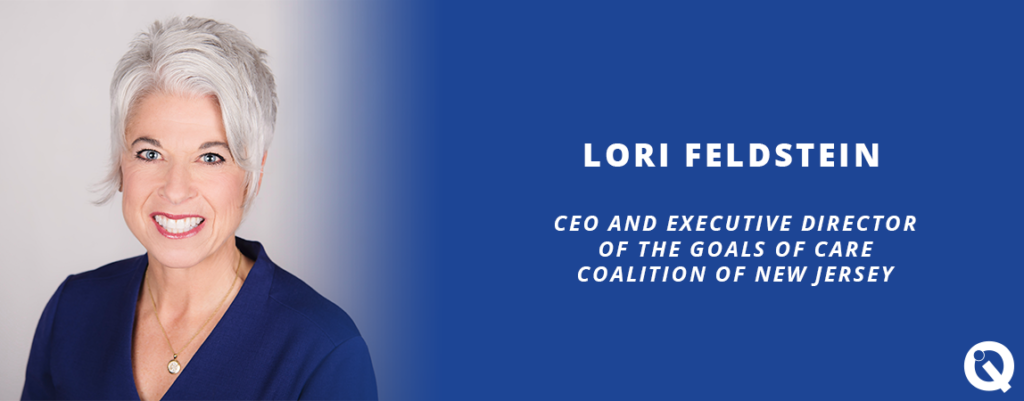Lori Feldstein, CEO and Executive Director of the Goals of Care Coalition of New Jersey, a non-profit organization working to improve shared decision-making between health care providers and patients and their families. Goals of Care Coalition is a member of the Quality Institute’s Consumer Council and a close partner in our Conversation of Your Life (COYL) initiative.
Can you share the mission of Goals of Care Coalition of New Jersey?
Our mission is to increase access to high quality and person-centered care for people facing serious illness. The way that we do that is by convening stakeholders, identifying unmet needs, advocating for equitable policies and improved health outcomes, and then sharing best practices and resources. Our Coalition is comprised of more than 35 statewide organizations that represent the interests of older adults and people with serious illness, and the very diverse group of providers who care for them. Our focus is research, education, and advocacy.
How do you see the importance of increasing education around end-of-life care for patients and providers, including your work with the Quality Institute’s COYL program?
Our organization and COYL both know there are misconceptions and inadequate knowledge that lead to apprehension among patients and family members. The lack of knowledge is a barrier to advance care planning and even palliative care and hospice care services. We know that a lot of people think palliative care and hospice care are the same thing. Many associate palliative care only with end-of-life care. Unfortunately, those misconceptions persist even in the provider community. We know a tremendous amount of education needs to be done.
Everyone feels better when we honor patients’ wishes and ultimately deliver care that aligns most closely with their goals. Together with COYL, we’ve completed educational programs throughout New Jersey that are centered around changing the culture as it relates to this conversation. Together we’ve reached out to faith-based communities because we recognize these conversations are happening in churches, synagogues, mosques, and in Hindu temples. The faith community can be incredibly important in helping people get more comfortable with these conversations.
You have launched Your Care Plan, a video-guide to POLST. Can you tell us about this tool?
It’s a web-based program to help health care providers facilitate a conversation with patients that ultimately results in a completed POLST form. A POLST is a medical order that must be followed by EMS, hospitals, or long-term care facilities — wherever the patient resides. It is part of the medical record and follows the patient. A POLST differs from an advance directive, which is a legal document that provides information on your values, beliefs, and wishes for care or treatment. An advance directive must be interpreted by the designated proxy and if it is unclear, or the proxy is not present or reachable during the emergency to make medical decisions, then providers must err on the side of life-preserving treatment. The POLST, being a medical order, will be followed as written.
The Your Care Plan tool uses brief videos, guided scripts, and some gentle prompts to help inform the patient about the decisions that are part of the POLST form. As the patient and provider move through each page on this web-based program, they watch a brief video, discuss, and then document decisions about what life-sustaining treatments the patient might or might not want. At the end of the conversation, the patient and the physician have a completed POLST form that can be uploaded to the patient’s electronic medical records.
Who have you partnered with so far, and how are they using this tool with their patients?
Your CarePlan is available to 50 long-term care facilities affiliated with the RWJBarnabas Health System. The work began during the COVID-19 pandemic to ensure that our frail elders, or our seniors living in skilled nursing facilities, have their wishes documented — so they can get the care they want and no more and the care they need and no less. The tool is also being used in several primary care practices in partnership with Penn Medicine Princeton Health as part of a value-based, primary-care-first model.
We’re excited about two other opportunities: piloting a program with a federally qualified health center in New Jersey and with one of our leading cancer centers. These programs all create opportunities for us to collect data on the impact and use of the tool, which we hope we’ll be able to share in the next year or so.
We like to ask a question beyond people’s professional lives. Where might we find you when you are not dealing with these difficult and emotional issues?
Walking the beaches of Seven Mile Island. That’s Avalon and Stone Harbor in New Jersey. When I was a kid, we spent a lot of time there in the summers, and it’s my go-to happy place. That’s where you will find me when I am not working.

